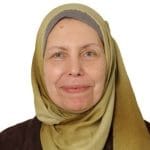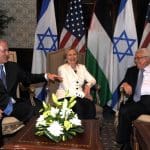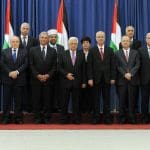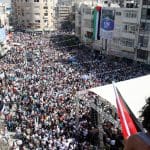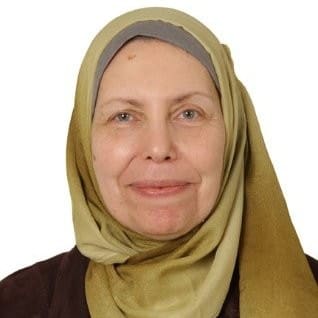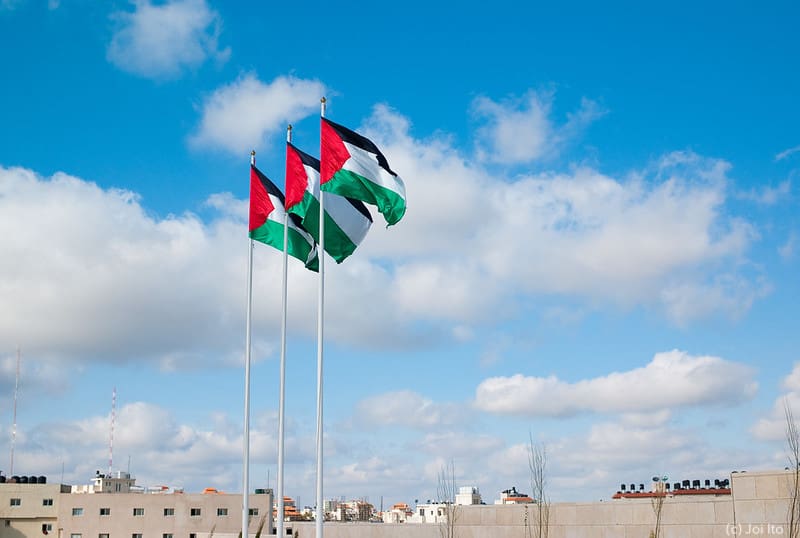
Overview
Many Palestinians seek more effective and democratic representation, and to this end advocate reform of the Palestine Liberation Organization (PLO). However, Osamah Khalil warned last month, in “Who are You?”: The PLO and the Limits of Representation, that attempts at reform would end up saving a leadership that had lost its legitimacy and argued that a new representative body is needed to achieve Palestinian rights.
In this Al-Shabaka roundtable, policy advisors and members debate this perspective. Rana Barakat suggests that Palestinians are asking the wrong questions: The discussion should not be over whether to salvage or abandon the PLO, but how to imagine and execute liberation in political, social, cultural, and economic terms, a framing that puts the value of the PLO in context. Mouin Rabbani notes that the PLO was at its most representative when it was least democratic in conventional terms; he questions whether elections make sense in the Palestinian context, and calls for consensus on the national project as the first priority.
Dina Omar evokes Ghassan Kanafi’s writing on “blind language” and its obstruction of strategic analysis and, after reviewing recent attempts to revive the PLO, concludes that it may be better to start from scratch. Fajr Harb argues strongly for reforming the PLO beginning with an overhaul of the Charter to represent Palestinians everywhere; otherwise, he warns, Palestinians risk acquiring yet another semi-functional body and becoming more divided than ever. Hani Al-Masri contends that calling for an end to the PLO without a clear alternative in sight could result in a much worse situation of fragmentation into disparate local, tribal, or sectarian groups and the complete dissolution of the Palestinian cause.
As’ad Ghanem points to the common causes at the heart of the Palestinian and Arab conditions and calls for rebuilding the Palestinian national entity after the PLO has “expired” based on seven fundamental principles. Yassmine Hamayel believes Palestinians need to dig into the early part of PLO history and the First Intifada to rediscover ways of working together to build a national identity and resistance, a time when being Palestinian was more than belonging to a political party. Aziza Khalidi calls for accelerating the transformation of an existing Palestinian global cultural space into a more cohesive “global cultural community” that would provide opportunities to create a more effective governance structure.
Rana Barakat
Khalil argues that the PLO is no more than a shadow for the corruption of those few men who have occupied its positions, committees, and status. He questions those who have tried to find ways to salvage the institution and its potential, and dutifully presents the contemporary and potential disasters in advocating the path for renewed elections to the Palestinian National Council (PNC).
Others have tried to imagine the PLO’s salvation by going beyond this corruption and even beyond the symbolic value of the PLO as a liberation movement and focusing on its organizational structure. Their argument is that if all Palestinians within mandate Palestine and throughout the Diaspora were afforded a viable means of voting in elections (a difficult feat), then a council could be validated to truly represent the interests of the entirety of the Palestinian people.
Khalil claims this scenario is difficult to imagine given the overwhelming opposition to representational power within the Palestinian Authority (PA) and the imperial powers to which it is beholden. He describes the PLO as nothing but an impediment to national liberation and boldly calls for the final and complete death of the PLO.
This might be a logical conclusion: If popular representation is the key to building a liberation movement, then the PLO was never entirely that. Nevertheless, it remains popular among a great number of Palestinians. This popularity cannot be overstated, given all the discussions that testify to the collective anxiety, if not agony, over declaring the PLO dead.
But the debate does beg another question: Why are all these discussions about liberation-through-representation mainly about elections? Are elections, even if they are universal, free, and “fair,” the best and only means to achieving a representational liberation movement? Are the ideals embedded in the liberal notions of citizenship in modern nation-states the key to (re-)establishing a liberation movement?
Perhaps, as others have argued, the problem lies in how the “organization” part of the PLO has been imagined and executed. If the state model is the basis, then the “organization” might actually negate the liberation aspect in the PLO. The results of the Oslo process, in particular the PA, are not necessarily an anomaly or a corruption of the PLO, but rather the result of a historical process that abandoned the popular will and liberation of Palestine long before 1993. The best of elections within these structures will merely continue the historical process and only superficially address our current malaise.
The PLO, however, is not only about organization but also – at least rhetorically – about liberation. The questions Palestinians face, then, are not the limited and limiting discussion over whether to salvage or abandon the organizational structures within the PLO. Rather, they should be about how to imagine and execute liberation-through-resistance in tactical, political, social, cultural and economic terms. In the context of a liberation movement, representation and popular will are not the product of statistics and an electoral process, but rather the basis for and continued driving force behind resistance.
In this context, the symbolic and historic value of the PLO as a resistance and liberation movement is made clearer. Without recognizing this symbolic and real value in a unifying entity that is the embodiment of the liberation of Palestine, the politics of Palestine can be sold to the highest bidder regardless of their nefarious and factional agendas, which is arguably the current state of affairs in both the West Bank and Gaza.
Mouin Rabbani1
Elections are of course only one element of democracy, which also requires pluralism, institutions, freedoms, and other elements. Looking back upon the Palestinian experience, it is noteworthy that the PLO was most representative – whether judged in terms of leadership, institutional composition, policies, or virtually any other criteria – when it was least democratic in the conventional, contemporary sense of the term. The PLO was a highly pluralistic entity, and in this respect easily and successfully competed with not only organizations such as the Algerian FLN and Vietnamese NLF, but also for example the ANC of South Africa.
It is perhaps the greatest irony that those qualities democracy is supposed to preserve and promote, such as representation, the supremacy of institutions, leadership renewal, peaceful transition of power, and an inclusive policy process, began to decline and in some cases disappear altogether after the introduction of elections in the context of the 1993 Oslo Agreement and the establishment of the Palestinian Authority.
This of course has more to do with the nature of Oslo and the PA than it does with elections. Yet, we need to examine whether Palestinian elections – particularly free and fair elections – ultimately contributed to or undermined Palestinian democracy, the rights and freedoms of citizenship, and the struggle for Palestinian self-determination. Put simply, did they promote or hinder the national project? This in turn raises a broader question: are competitive democratic elections an appropriate instrument for Palestinians to overcome the particular crises confronting them at this stage in their history?
In this respect there are several pertinent observations to be made regarding the consequences of Palestinian elections since the Oslo agreements:
- These elections have done nothing to enhance the legitimacy of those elected.
- These elections have done nothing to promote Palestinian national unity. The 1996 elections were in fact the institutional expression of the most traumatic fragmentation to afflict the Palestinian people since 1948.
- These elections have done nothing to promote more representative institutions or greater popular participation in the policy process.
- These elections have done nothing to promote leadership renewal. This is, in fact, no less true of internal Fatah and Hamas elections.
- More recently, the demands for such elections have done nothing to promote Palestinian reconciliation. There appears to be some truth to the conclusion by Jamil Hilal that elections conducted under conditions of foreign domination or intervention – such as in Iraq, Lebanon and Palestine – tend to exacerbate polarization rather than contribute to unity.
Under current circumstances, therefore, the priority should be a reconstruction of pluralism, and formulation of an inclusive national program and strategy based on consensus and that mobilizes the Palestinian people in its entirety. And, at least for the time being, elections would appear to form an obstacle to this process. Experience demonstrates that elections make sense only when they further an existing national project, and fail when they are perceived as the solution to its crisis.
This holds no less true of the demand for PNC elections as the method of reviving the PLO. It is questionable whether such elections can indeed be held. But even if they can, the PLO needs to be revived first for such an exercise to be meaningful. Unattractive as it may sound, what is required first is consensus and agreement among the dominant parties about the national movement, national project, and national program. Once the supreme national interest has been agreed and defined, we can then determine – through competitive democratic elections if feasible – who is most qualified to lead this project and implement this program.
Dina Omar
In discussing the current political impasse that Khalil thoroughly illustrates in his policy brief it is useful to recall Ghassan Kanafani’s critical essay “Thoughts on Change and Blind Language” after the Arab defeat of 1967, which shows that the problem of representation is by no means a new dilemma.
Since the 1990s we have seen various campaigns to restructure the PLO and especially the PNC, most notably the initiative backed and organized by Edward Said and Mustafa Barghouti in 2002, al-Mubadara al-Wataniyya al-Filistiniyya (The Palestinian National Initiative or PNI). There was also a short-lived group in 2010, al-Haya’ al-Wataniyya al-Falistiniyya, led by Azmi Bishara and Bilal Hassan. Both of these initiatives attempted to change the existing structure from within. This model is emerging again with the new popular appeal from Palestinians living within Palestine and the shatat to organize a registration campaign to democratically vote for a new PNC. Khalil situates this initiative in a historical context and concludes that the probability of success is low. Therefore, he suggests that perhaps it is best that we start from scratch.
To be clear, I do not wish to criticize the PLO for the sake of disparaging or dismissing the PLO as a body or those people who have undeniably sacrificed a great deal to represent the Palestinian people. However, the PLO has failed to prevent a non-democratically elected oligarchy from governing indefinitely. When the Palestinians call attention to this lack of accountability, patriarchal rhetoric is used to evade criticism. Most PLO “ambassadors” and officials will claim that we who question their authority “do not know” the sacrifices they have made. We are considered “disrespectful,” we are told that we “were not there” in Lebanon in the 1980s, in the West Bank during the Second Intifada, in Gaza. We are told that we could not possibly understand what it is like to “live under occupation,” “to be in administrative detention,” “to live under siege or bombs.”
Ghassan Kanafani calls this rhetorical approach to silencing dissent “blind language.” It is precisely this blind language that is inhibiting the rejuvenation of a political body and that is undoubtedly strengthening the occupation. Kanafani writes that failing to introduce new blood into a political body “is a crime” that “not only obstructs the arrival of a youthful vanguard, bringing new blood and influence [but] also obstructs a clear view of the enemy and a recognition of the depth and breadth of the danger it poses, as well as the establishment of any firm strategy for confronting it.”
I don’t know if the PLO is beyond saving. I do know however, that previous attempts to save it have failed and the likelihood of further attempts emulating the same models are bleak. I supported the initiative for PNC elections because there is a dearth of well-organized strategies to reconfigure the PLO. But perhaps reconfiguring a political apparatus from the ground up to represent the Palestinian people is a better alternative.
Fajr Harb
Although I agree with the assessment of many of the factors that rendered the PLO ineffective, I disagree that the solution is creating a new representative body. Khalil is correct to suggest that we should examine what made the current PLO ineffective, such as lack of independence from external forces and internal checks and balances, but reform can come by revolutionizing the PLO itself and not by creating yet another body.
One of Khalil’s main arguments in favor of abandoning the PLO is that PNC members are chosen by quota, and that the political parties making up the PLO are themselves undemocratic and unaccountable. However, the author tends to overlook the huge number of Palestinians belonging to political parties. How does he envision the members bound within their parties’ framework defying their leaders’ authority in such a critical matter? Would changing the face and name of the representative organization render individuals more democratic? The problem is not merely the structure and vehicle of representation, but also the peoples’ understanding of authority. We need to work on reforming ourselves as individuals that belong to a society based on resistance along with reforming the body that unites us all.
In addition, abandoning the PLO to start a new organization from scratch means abandoning the legal and public national and international recognition the PLO earned. Acquiring such recognition anew would require immense efforts that the Palestinians can and should be channeling elsewhere. Creating a new organization would merely add unnecessary complexity to the Palestinian system of representation. The mandates of the PA and the PLO have been intertwined, creating a complicated and overlapping system of authority and power. Creating a new body that would attract the disapproval and criticism of the Palestinian political parties, to say the least, would result in three semi-functional bodies, leaving the Palestinians even more divided than they started.
Thus, our best option is to rebuild the PLO on a democratic basis, and to find a mechanism to ensure accountability and representation, which necessarily means that the PLO structure as it is today would have to be changed even before holding new PNC elections. As many Palestinian scholars have suggested, including Jamil Hilal, we should start by reforming the PLO charter to outline the core principles representing all Palestinians in all their places of residence. The Charter should take into account the circumstances of each Palestinian community, whether living under military occupation and apartheid or in the diaspora. The new charter would be the basis on which we can build our strategy for liberation.
I believe direct and periodic elections for the PNC are the best safeguard to ensure real representation and accountability. To that end, the civil society campaign to register Palestinians for PNC elections has been an inspiring first step to prove that elections are possible under all circumstances. It will be up to us to find the political will to ensure that elections happen periodically.
Hani Al-Masri
Osamah Khalil’s paper raises controversial and noteworthy issues that deserve further discussion. The paper argues that it is neither possible nor necessary to revive and rebuild the Palestinian Liberation Organization (PLO). However, since it offers no clear alternative to the PLO, the logical conclusion in practical terms is to endorse the status quo in which the Palestinian cause is being squandered. The attempts to terminate the cause are increasing, and they are essentially founded on eradicating the PLO, because it is a single national body inclusive of Palestinians at large.
If the paper is suggesting that it is necessary to create a new Palestinian liberation movement, then this ought to be explicitly articulated with clear justifications. The conditions, prospects and guarantees of success also ought to be explained.
However, if the paper is only suggesting that an announcement of the death of the PLO be made, then this will contribute to the eradication of the PLO and its replacement by a self-governing authority or “miniature state.” Thus, the PLO would only continue to exist to serve local, Arab and international parties and to perform its last task: To sign a final agreement designed to eliminate the Palestinian cause in the name of the Palestinian people.
The PLO did indeed benefit from the Cold War and Arab and international conditions during the 1960s, 70s and 80s. But its raison d’être depends on being a national liberation movement that still aims to abolish the colonialism, occupation and injustice done to the Palestinian people.
To call for eliminating the PLO, either directly or by rejecting calls to rebuild the organization, could lead to an even worse situation and the emergence of local, regional, tribal and factional leaders rather than new political parties or social movements that might be harbingers of change. This would take us back to dealing with the Palestinian cause as a humanitarian one.
There are many more reasons for Palestinians to be united than divided, and this is the foundation for the existence of the Palestinian cause. Despite the marginalization, failures and sins of the Palestinian leadership and parties inside and outside Palestine, the Palestinian cause remains alive, thanks to the Palestinians’ steadfastness and struggle. Nor can the role of factions be completely overlooked, as they still dominate the Palestinian scene and the formation of new movements remain limited.
As long as the PLO’s leadership and the various factions within and outside the PLO remain opposed to the occupation, albeit at varying degrees, a glimmer of hope remains. So long as Fatah or Hamas, moderates or extremists, remain committed, even if only verbally, to the struggle to end the occupation as well as to ending the division and working within the framework of one liberation organization, then we must hold on to this glimmer of hope. We must follow through on its potential and exhaust all possible means to bring it to life, while at the same time promoting new movements and forces.
Finally, what is required is a new national Palestinian uprising capable of rebuilding the PLO whether with the assent of – or, more likely – despite its leaders and member and non-member factions, just as happened in 1968. In that year, the factions of the Palestinian revolution rebuilt the PLO, which had originally emerged to respond to the needs of the official Arab regimes rather than the needs and priorities of the Palestinian people.
As’ad Ghanem
Khalil argues that Palestinians are almost a lost cause: Their struggle is very fragmented and weak and they don’t have a clear political and united body to represent them as a people seeking self-determination on their land. He calls for new ways of thinking, including reevaluating the Palestinians’ collective leadership and its conduct and leading the way for a new representative body. Among other things, he points out that the Palestinians have been largely on the sidelines of the Arab Spring.
It is worth noting that social, economic, and political factors that led to the Arab revolutions all exist in the Palestinian case. Take, for example, the founding statement on 21 May, 2011, by The Civil Assembly for Freedom, Democracy and Social Justice in Palestine and the Diaspora, which said it was formed in response to a blocked political horizon, the absence of a genuine peace process and continued siege and suffering, the absence of an effective Palestinian strategy and political divisions, corruption, absence of rights and a sense of injustice, severe economic deterioration and extreme poverty, the “harsh spread of despair,” and “societal collapse and disintegration.” This statement summarizes the social, economic, and political causes behind the Arab revolutions, all of which are present in the Palestinian context.
The Palestinians must find the will to convert the lessons of the Arab revolutions into concrete political work in two ways. First, there is a need to reformulate the national Palestinian project into an inclusive one for all Palestinians, and not just a select group, as has been the case ever since Fatah took over the reins of the national movement. It is not possible to take this first step if the current forces – Fatah and Hamas (and the rest of the PLO political factions) – remain in control of the national movement. Thus, the second step involves rebuilding the national entity that represents all Palestinians after the PLO, in its historical form, has expired. These two conditions are fundamental requirements in order to reestablish the Palestinian project as an inclusive one that represents the entire Palestinian people.
Attempts to achieve this mission should be based on the following principles:
- The Palestinians are one people and one cause, wherever they live and whatever citizenship they are holding.
- All Palestinians without exception have the right to approve or reject any solution concerning their cause. No authority has the right to impose any solution without their approval, wherever they live.
- Any representative Palestinian organization must get its legitimacy and authority from the Palestinian people and only they can grant or withdraw this legitimacy.
- It is not acceptable to give up the rights of a part of the Palestinian people in order to fulfill the rights of another part.
- Palestinians are brothers and sisters despite their different political affiliations: Their internal disagreements should never overcome their conflict with Zionism.
- Israel’s occupation, settlements, deportation, and racist and religious discrimination are the main source of violence in the Arab- Israeli conflict.
- The Palestinians have the right to resist the historical injustice against them until it ends.
Yassmine Hamayel
Calls for reforming the PLO are perhaps as old as the PLO itself. Even though registration for the civil society campaign for PNC elections has already started, most remarkably in Syria’s Yarmouk Refugee Camp, and is a welcome development, we should view this with cautious optimism to say the least. Elections for Palestinians have become a symbol of resilience and circumventing difficult times of conflict. However, based on our recent history of participation in the PLC elections, a one-time one-person one-vote doesn’t really bring the Palestinians more representation. Moreover, the last PNC Council in 1998 accepted the two-state solution and a peaceful settlement of the Israeli-Palestinian conflict. Now Abu Mazen (PA head Mahmoud Abbas) has presented the PNC elections law to the PLO executive committee for approval; meanwhile disagreements remain on the way to elect the Palestinian Legislative Council and its relationship to the PNC. In reality, what we Palestinians need is a new collective resistance ethos that gathers Palestinians around a set of goals and objectives, the foremost of which is to resist Israeli settler-colonialism.
The early history of the PLO contained significant successes in organizing and mobilizing the Palestinian masses behind their national cause and the resistance. Political parties and youth groups can get out of this present fragmentation and marginalization by raising awareness about the earlier “revolutionary” period of the PLO, build networks of communication with people from across the political spectrum, villages and towns. In addition, in the period leading up to the First Intifada in 1987 and during the Intifada itself, Palestinians were mobilized socially and politically. Political party members and non-members used to have political education and most importantly the parties were strong due to the many personal and close relationships they used to build with the people creating a solid foundation for collective work.
Palestinians everywhere – within historic Palestine and in refugee camps in exile – need to do this again, to rebuild our national identity and resistance by working together. We need a new resistance discourse that redefines Palestine and Palestinians in a way that emphasizes the justice of the cause on the basis of Arab national liberation. At a certain stage belonging to Palestine indirectly meant being a member of Fatah or Hamas or other political parties and abiding by their by-laws and regulations. Allegiance to particular parties has diluted the sense of Palestinian nationalism. We need to re-define notions of loyalty, belonging, and commitment to encompass Palestine and Palestinians outside the purviews of the political parties and political system.
Aziza Khalidi
Parallel to the current critical discourse regarding the utility of the PLO as the structure of governance for Palestinians it is time to explore an invisible yet vibrant Palestinian global cultural space. Within this fertile space many initiatives thrive in various configurations and some may already be nurturing embryonic options for change.
After all, “Palestine” is a construct describing a “homeland denied” and “Palestinian” is an attribute of a primordial dimension of personal identity that has persisted among millions who relate to historic Palestine – it is also recognized by the multitudes that pledge solidarity with the Palestinian people. These two concepts have transcended the ebbs and flows of bloody as well as petty politics. They have manifested their constancy since 1948, across the globe, within and outside the boundaries of the “homeland,” and among the poor as well as the rich.
This global Palestinian cultural space has included diverse humanitarian and development initiatives whose building blocks encompass the cultural networks of towns, villages, communities, and individuals worldwide, women and men, young and old. Its potential includes: a global safety net grounded in the many humanitarian initiatives across the globe; a global dialogue among all Palestinians consolidating and reinforcing initiatives on oral history and supporting innovation and the arts; and an expanded effort to visit, “touch,” and “taste” Palestine through trips, food, literature, and audio-visuals.
Currently, the major driving force that protects the concepts of Palestine and the Palestinians appears to reside in this global cultural space. There is a need to morally and financially support more political dialogue within the framework of this thriving global cultural space, helping to catalyze a more integrated global community that would contribute to a more effective and representative governance structure.
Editor’s Note: To read the original policy brief, which addresses several of the arguments made above, see “Who are You?”: The PLO and the Limits of Representation.
- Rabbani’s contribution to the roundtable is excerpted from his broader and more comprehensive discussion paper published by Masarat.
Al-Shabaka Policy Member Yassmine Saleh Hamayel is working on gender and security in Ramallah, and is active in the Palestinian youth movement. Her areas of interest include democratization, development, youth, and refugees.
Rana Barakat is an assistant professor of history and contemporary Arab studies at Birzeit University in Palestine. She received her Ph.D. from the University of Chicago writing about popular politics and resistance in early twentieth century Palestine. Her research interests include the social history of Jerusalem, colonialism, and revolutionary social movements.
Mouni Rabbani is an independent writer and analyst specializing in Palestinian affairs and the Arab-Israeli conflict. He is a senior fellow at the Institute for Palestine Studies and is a Contributing Editor to the Middle East Report. His articles have also appeared in The National and he has provided comments for The New York Times.
Hani Al-Masri is Director General of Masarat, the Palestinian Center for Policy Research and Strategic Studies. He founded and was director general of the Palestinian Media, Research and Studies Centre, Badael, between 2005 and 2011. He has published hundreds of articles, research and policy papers in Palestinian and Arab magazines and newspapers including Al-Ayyam and Al-Safir. He previously served as General Manager of the Printing & Publication Department at the Ministry of Information and as a member of the Committee on Government in the Commission of Dialogue held in Cairo in 2009. He is a member of the board of trustees at the Yasser Arafat Foundation.
Dina Omar is a writer and a graduate student studying Anthropology at Yale. She is a founding member of Students for Justice in Palestine-National and serves on the National Executive Board of the Palestine Youth Movement.
Al-Shabaka Policy Member Fajr Harb is a Palestinian political activist. He is currently the Assistant Director of The Carter Center Field Office in Ramallah. In addition to his experience in advocacy and fundraising, he has an academic background and training in the United States in both engineering and economic development.
Aziza Khalidi serves on the board of the Najdeh Association and is a founding member of the Forum of Palestinian women in Lebanon, a network of non-governmental organizations promoting the implementation of the Convention on the Elimination of Discrimination Against Women. She is also affiliated to the faculty of economics and business administration at the Islamic University of Lebanon. She works as a freelance research consultant in areas pertaining to health and development for refugees in general, gender issues, and elderly. Contributed to design, implementation and report write up of several field surveys.
As’ad Ghanem is a senior lecturer at the School of Political Sciences, University of Haifa. Ghanem’s theoretical work has explored the legal, institutional and political conditions in ethnic states. He has covered issues such as Palestinian political orientations, the establishment and political structure of the Palestinian Authority, and majority-minority politics in a comparative perspective. His books include Palestinian Politics after Arafat: A Failed National Movement (Indiana Series in Middle East Studies). Ghanem has initiated several empowerment programs for Palestinians in Israel.















